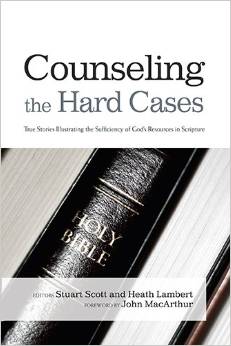Is Scripture sufficient to address all the needs of the soul? The griefs, the addictions, the pride, the anger, the lust, the wounds, the fear, the sin?
I know the right answer is “Yes.” I know that is the answer I am “supposed” to give, as a Christ-follower.
But, I’m not sure that I have believed it, whole-heartedly; and I certainly know that I haven’t lived it.
I received a review copy of the book Counseling the Hard Cases from Broadman & Holman publishers to provide a review here on my website. I expected that I would find it interesting, which I did. I did not expect to find it challenging, as in, challenging of my views on scripture.
My undergrad degree is in psychology/sociology, a degree I pursued mainly to try to “fix” myself. I found, in my courses of study, though, that I was a good listener. A good counselor, if you will. I excelled at case studies and in our video-taped sessions.
I’ve also participated in personal counseling and psychiatric visits as a result of challenges in my own life. The personal counseling was of good benefit–it went to great lengths to get me moving again after my ex-husband was imprisoned and the subsequent divorce. It helped me with parenting my kids through the huge turmoil of that. It assisted not in reconciling past pain with my present grief, but rather “framing” that pain in a manageable way. And, it was interesting.
My visits with the psychiatrist–not so much. They consisted of hour-long waits, because he was always late, as in, not-even-in-the-office-yet-when-I-arrived late. Our visits were usually 10 minutes long, and each week I seemed to emerge with new medication. Eventually I was on 2 antidepressants, 1 mood stabilizer, 1 anti-anxiety med, and Ambien.
Each author in this book seemed to lean quite a ways away from the use of medication. I will not say that the meds were not helpful for me, personally. At the point of crises, they (or, at least a couple of them) were of assistance. I am not one to believe that there is no place for medication when confronted with ongoing issues of the mind. But, the authors are correct on this point: medication does not change the soul. It may level things out so that the soul is more readily available for work and change, but it does not change the soul. I am no longer on any such medication. In my case, I began to not trust my doctor and his tendency to continually increase and add medication when he really didn’t know me. Plus, I knew my addictive behavior. I was headed down the wrong path.
In this book, Counseling the Hard Cases, the authors present a series of case studies–actual counseling cases that they have encountered. They attempt to show how they used scripture, alone, to guide each counselee.
I have to say, they made a convincing case.
I certainly did not agree with all of their methods or approaches; but I know few, if any therapists who agree 100% in methodology. There is always something we would do differently.
Also, there were times that I vehemently disagreed with the use of particular scripture, applied in particular ways, to particular situations. Proof-texting is wrong, no matter what the setting. Reading into scripture something that is not there is wrong as well. And, offering the trite and cliché to hurting souls does nothing but encouraging them to rely on the trite and cliché. I’m not saying scripture is ever trite or cliché, but when used in the wrong context or used as a magical formula, we as fallible humans water it down to that. This should not be.
But, those negatives aside, this certainly did some re-ordering to my view of scripture and its ability to be sufficient. No, that’s not correct. It’s not that it has the “ability” to be sufficient. It is sufficient.
Reading this book led me to an in-depth look at 2nd Timothy 3:16-17:
Do I believe this is truth? Do I believe it is truth in the lives of the people God brings to me who are in dire need of His grace? Who are experiencing real crises? Do I believe it is truth in my own life–every single, ordinary, routine day?
Some of this book was hard to read. Some of it was irritating. Sometimes I wanted to shake the counselors. Sometimes I wanted to shake those being counseled. But I cannot deny that those instances were few in comparison to the points where I saw evidence of scripture applied correctly making actual soul change. That this surprised me is absurd, because I know the change that scripture has wrought and is working in my own life. But I needed a “bigger picture, Step-outside” reminder.
I don’t know why God chose scripture–His word–as the vehicle for His gospel. Why not His physical presence, on this earth, continually? Why leave it in the hands of us–He knows we are sinful, messy people. I have my theories, but I have no answers. But even without answers to those and other questions, I know that doing scripture work–the meditation upon, the reading of, the hearing of, and the application of–produces soul changes, even in the most hopeless of situations.

